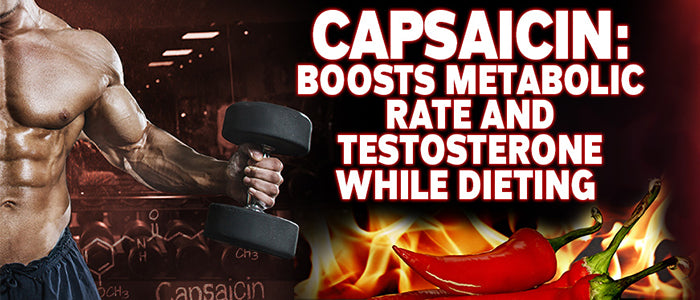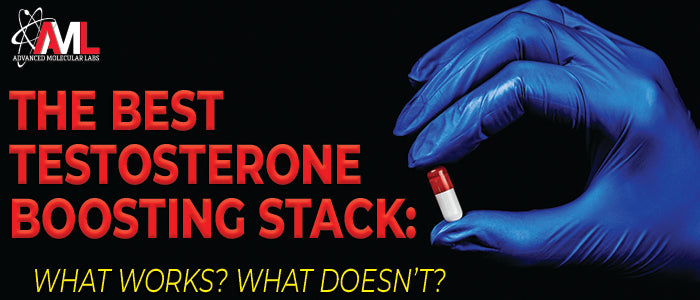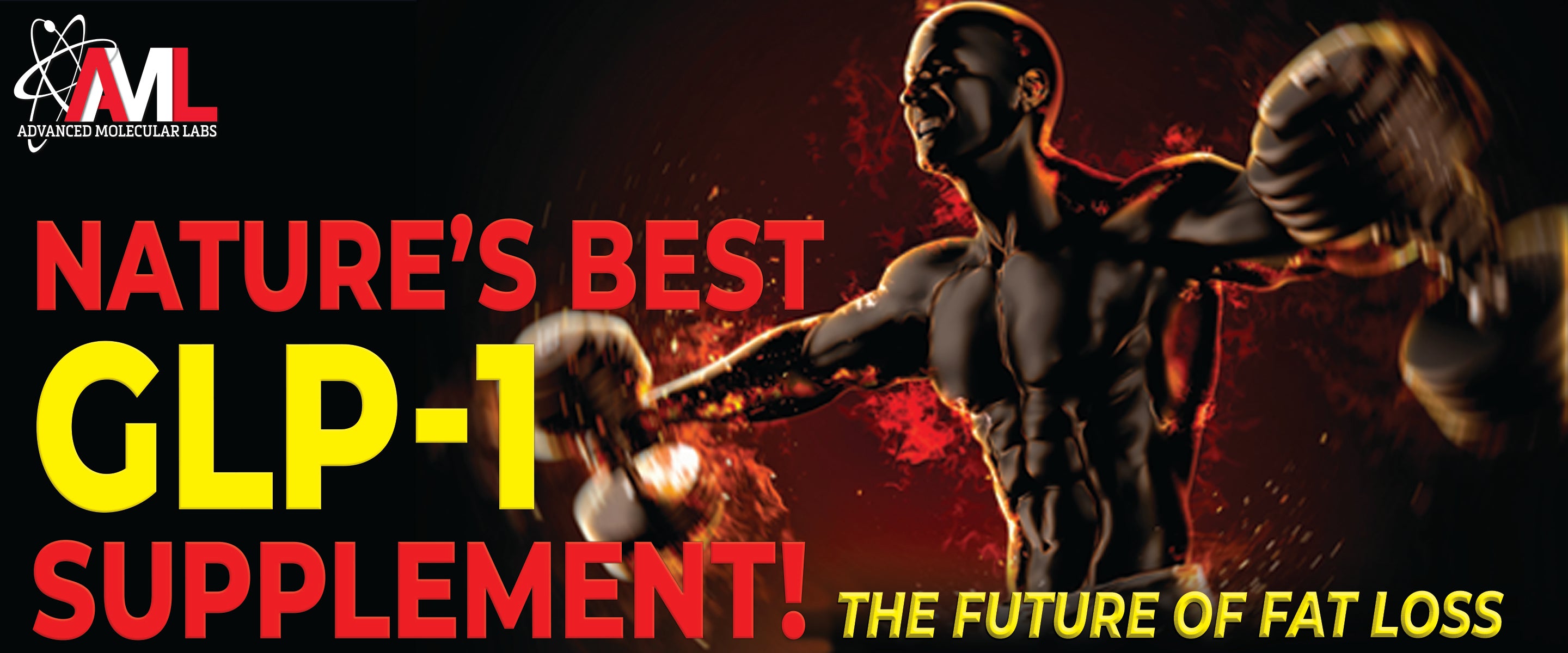


Capsaicin | Boosts Metabolic Rate and Testosterone While Dieting
Many people can lose weight for a few months, but many struggle to maintain that weight loss over longer periods of time. One explanation for the inability of long-term weight loss is that dieting initiates homeostatic mechanisms that reduce energy expenditure within the body, ultimately promoting a positive energy balance that results in a return to previous weight levels. Of course, reduced energy expenditure from low caloric intake also makes it difficult for anyone trying to exclusively gain lean muscle mass, as depleted energy expenditure also inhibits fat loss. Consequently, the capacity to blunt this diet-induced reduction in energy use should enhance the ability to decrease body fat and keep it off, too.
Thermogenically Increase Energy Expenditure
Attempts to advance weight loss, and weight-loss maintenance, by increasing energy expenditure have recently embraced the use of several naturally occurring compounds, including capsaicin, which is the agent in chili peppers that provides the hot and spicy flavor. Capsaicin has been shown to potently increase energy expenditure by stimulating a process known as thermogenesis.1 Although the mechanism of action is not completely understood, some of the details include capsaicin activation of the TRPV1 receptor found within the oral cavity, and gastrointestinal tract, which triggers the release of noradrenaline. The release of noradrenaline then increases energy expenditure and fatty acid oxidation within brown adipose tissue (BAT) by stimulating thermogenesis, which uncouples the normally linked process of fatty acid oxidation with cellular energy production in the form of ATP. As a result, instead of the energy from fat being used to synthesize ATP, which requires active processes like muscular contraction to increase energy expenditure, energy is instead directly converted into heat, increasing energy expenditure.
The ability of capsaicin to curtail the decreased energy expenditure caused by dieting should improve the ability to shed, and maintain the loss of, unwanted body fat for considerable periods of time. Furthermore, thermogenically induced energy expenditure is not inhibited by caloric restriction like many other energy-consuming processes that are turned down by the previously mentioned homeostatic mechanisms. This, of course, means that no matter how hard you diet, capsaicin will still boost energy expenditure. In fact, the more severe the diet, the more likely you are to benefit from capsaicin— as greater levels of caloric restriction more potently diminish metabolic rate, giving capsaicin a greater opportunity to supplement this deficiency in energy expenditure.
Reignite a Sluggish Metabolism
In order to see if capsaicin could, in fact, diminish the reduced energy expenditure brought on by dieting, a recent study by Jannsens et al.2 looked at the influence that capsaicin had on energy expenditure levels in test subjects who consumed 75 percent of their normal caloric intake, with or without capsaicin. The results of the study showed that the group taking capsaicin had an effective negative energy balance of 20.5 percent, meaning they had a reduction in energy expenditure of 4.5 percent, while the group that did not consume capsaicin showed an effective negative energy balance of 19.2 percent, or a reduced energy expenditure of 5.8 percent. So, the group consuming capsaicin had a 1.3 percent higher energy expenditure relative to the control group, clearly demonstrating that capsaicin increased energy expenditure while dieting. In addition, the group taking capsaicin also showed a significant increase in fat oxidation, while there was no significant increase in fat oxidation in the control group. The increased fat burning induced by capsaicin will likely enhance body composition by promoting a reduction in fat mass.
This study by Jannsens et al. also demonstrated that the effects of capsaicin on energy expenditure and fatty acid oxidation require several days of capsaicin intake, at a dosage of 2.6 milligrams per day. This study clearly showed that energy expenditure and fatty acid oxidation did not increase in the first day, but did increase after a few days of capsaicin intake— and that consuming an amount of capsaicin lower than 2.6 milligrams per day had no influence on energy expenditure or fat burning.
Elevate Testosterone While Dieting
In addition to caloric restriction promoting a sluggish metabolic rate, caloric restriction also has the capacity to reduce testosterone production3, which likely contributes to the unwanted loss of muscle mass typically seen while dieting. The reason for this effect has to do, in part, with the low energy levels that come with caloric restriction, which slows down many biochemical processes that are not absolutely essential for survival. Regrettably, one of the non-essential processes turned down while dieting is the production of testosterone, meaning testosterone levels typically decline after extensive caloric restriction.
Fortunately, there may be a solution to this dieting dilemma, as it has recently been shown that capsaicin can reverse the negative impact that hypocaloric diets have on testosterone production. According to a study by Llhan et al.4, capsaicin accomplishes this by reducing production of the peptide hormone ghrelin, which is normally secreted by an empty stomach to tell the brain to increase hunger and promote food intake. It turns out that ghrelin also inhibits the production of testosterone, meaning that low-caloric diets— that naturally increase production of ghrelin, because the stomach is more likely to be empty— also decrease testosterone production. In fact, this study clearly shows that a dose of capsaicin lowered ghrelin levels in the testosterone-producing cells within the testes of rats, resulting in a large increase in testosterone.
This study also showed, somewhat surprisingly, that capsaicin actually increased serum levels of ghrelin throughout the rest of the body, which would suggest that capsaicin intake would decrease testosterone production— which, as previously mentioned, did not happen in this study. So, in rats, it appears that ghrelin influences testosterone production through an unknown mechanism that may involve the direct regulation of the testosterone-producing cells within the testes. On the other hand, in humans, it seems as if capsaicin has a more systemic effect, as capsaicin intake has been shown to decrease serum ghrelin levels5 and increase testosterone levels.6
In closing, the unique ability of capsaicin to increase energy expenditure and boost testosterone levels while consuming a low-calorie diet makes capsaicin a perfect choice for bodybuilders, especially during pre-contest training, when one is trying to shed as much body fat as possible without losing any muscle mass. Capsaicin also represents a very effective way for the non-bodybuilder to lose weight and keep it off, as many dieters today typically yo-yo back to their original weight, in large part because their metabolic rate becomes so sluggish, which promotes a positive energy balance that brings back those unwanted pounds that were so hard to lose in the first place.
For most of Michael Rudolph’s career he has been engrossed in the exercise world as either an athlete (he played college football at Hofstra University), personal trainer or as a research scientist (he earned a B.Sc. in Exercise Science at Hofstra University and a Ph.D. in Biochemistry and Molecular Biology from Stony Brook University). After earning his Ph.D., Michael investigated the molecular biology of exercise as a fellow at Harvard Medical School and Columbia University for over eight years. That research contributed seminally to understanding the function of the incredibly important cellular energy sensor AMPK— leading to numerous publications in peer-reviewed journals including the journal Nature. Michael is currently a scientist working at the New York Structural Biology Center doing contract work for the Department of Defense on a project involving national security.
References:
1. Whiting S, Derbyshire E and Tiwari BK. Capsaicinoids and capsinoids. A potential role for weight management? A systematic review of the evidence. Appetite 2012;59, 341-348.
2. Janssens PL, Hursel R, et al. Acute effects of capsaicin on energy expenditure and fat oxidation in negative energy balance. PLoS One 2013;8, e67786.
3. Houston ME. Gaining weight: the scientific basis of increasing skeletal muscle mass. Can J Appl Physiol 1999;24, 305-316.
4. Ilhan T and Erdost H. Effects of capsaicin on testis ghrelin expression in mice. Biotech Histochem 2013;88, 10-18.
5. Smeets AJ and Westerterp-Plantenga MS. The acute effects of a lunch containing capsaicin on energy and substrate utilisation, hormones, and satiety. Eur J Nutr 2009;48, 229-234.
6. Begue L, Bricout V, et al. Some like it hot: testosterone predicts laboratory eating behavior of spicy food. Physiol Behav 2014;139, 375-377.




